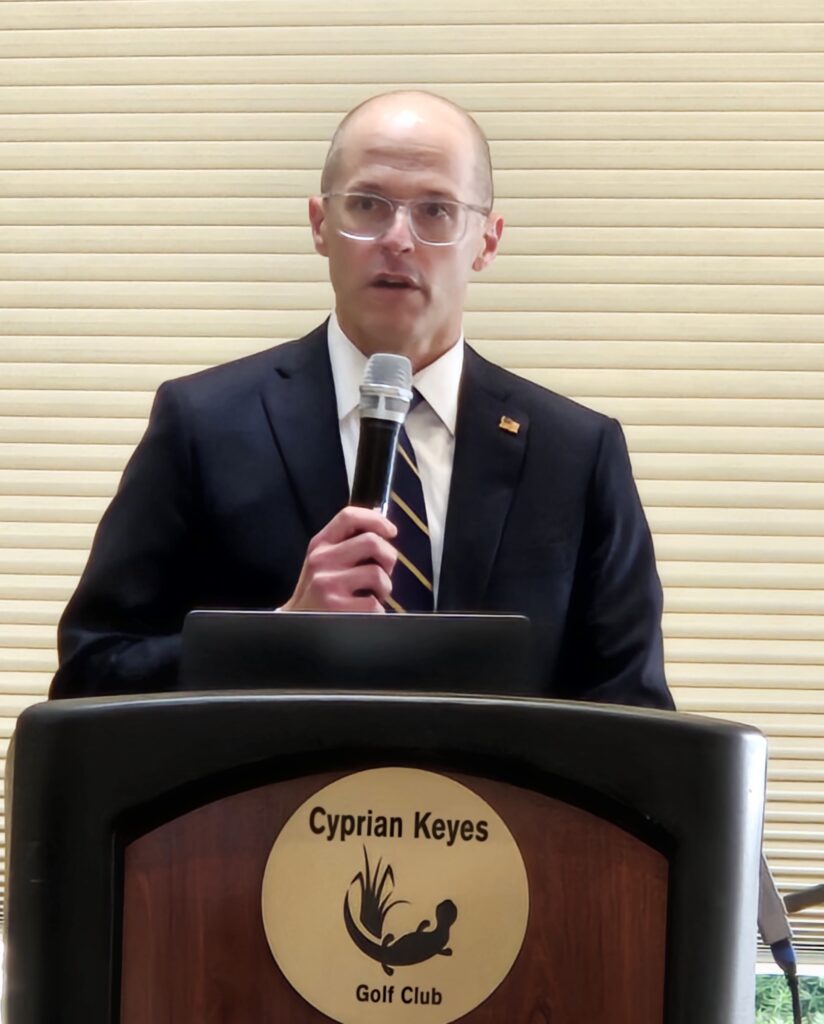The Massachusetts Municipal Association (MMA) issued a stark warning last week: Massachusetts cities and towns are caught in a perfect storm of rising costs, falling aid, and outdated limits on local revenue pushing many communities toward a fiscal breaking point. Several Acton officials attended the presentation of the report at Cyprian Keyes Golf Club in Boylston, MA. Acton Exchange interviewed those officials for this article.
In a new report produced with Tufts University’s Center for State Policy Analysis, MMA Executive Director Adam Chapdelaine said, “The colliding forces putting dramatic pressure on our local budgets are threatening the vital quality-of-life services that our communities deliver 24/7/365.”

A growing gap
The report, A Perfect Storm: Cities and Towns Face Historic Fiscal Pressures, finds that while state spending has grown 2.8% per year since 2010, municipal spending has increased only 0.6% per year after inflation — far below both state and national averages.
That gap is largely due to Proposition 2 ½, the 1980 state law that caps annual property tax increases at 2.5%. Since cities and towns in Massachusetts are barred from levying local income or sales taxes (except on meals and hotels), the property tax remains their only significant revenue source.
“In an era of high inflation,” the report explains, “a 2.5 percent increase in tax receipts means cities and towns are effectively obligated to cut real spending every year.”

Shrinking state support
State aid, once a reliable partner for local budgets, has not kept pace. Massachusetts cities and towns now receive 26% of their revenue from the state, compared to 31% nationwide.
The most flexible type of state support, Unrestricted General Government Aid (UGGA), has fallen 25% since 2002 after inflation. “Losing UGGA dollars hits hardest,” the report warns, “because it’s one of the few funds cities and towns can use flexibly.”
While the state has increased education funding through the Student Opportunity Act, those gains are concentrated in gateway cities such as Lowell and Springfield. Rural and suburban towns, including communities like Acton, have seen little benefit.
Unequal impact across the Commonwealth
The report shows that fiscal stress looks different depending on where you live.
- Rural towns are cutting education budgets and struggling to retain staff.
- Gateway cities are seeing improvements in schools but falling behind in nearly every other area.
- Suburban communities rely on temporary Proposition 2 ½ overrides to maintain services, although nearly 200 cities and towns haven’t passed a single override in the past 15 years.
Acton’s local challenge
For towns like Acton, where residents expect top-quality schools, safe streets, and strong civic life, these pressures are becoming harder to manage. The MMA report notes that many municipalities “have been keeping budgets balanced by cutting or reducing essential services,” a trend that risks eroding community vibrancy.

John Mangiaratti, the town manager of Acton, said, “The report highlighted concerns that we are experiencing in Acton, such as rapidly rising costs in critical areas such as energy, health benefits, supplies, construction, equipment, etc. Cities and towns are very restricted in their ability to raise revenues in order to balance their budget.”
Mangiaratti added, “In Acton, we have reorganized departments and reduced costs in many areas to help manage cost increases in these areas. We have also secured grants and identified creative ways to fund projects. I look forward to the next steps in the process, in which the MMA will identify potential solutions to this perfect storm. “
Alissa Nicol, vice chair of the Acton Select Board, said, “While it’s concerning to hear that cities and towns all over Massachusetts are facing unprecedented fiscal challenges — double digit increases year over year for health insurance and out-of-district tuition — the report confirms that Acton is not alone in this, even as some residents believe that budgeting challenges have been caused by fiscal town and school district mismanagement. I was a bit surprised to learn that state spending, adjusted for inflation, has increased so much more than municipal spending, and that state spending increases in Massachusetts are below the national average.”
Nicol added, “Many people think that officials’ answer is always ‘just spend more.’ It’s apparent that, at the local level at least, it’s not a spending problem. The costs of providing services are rising higher than inflation, and certainly higher than 2.5-3%. Municipalities need more financial support from the state, more flexibility in raising revenue, legislation that reduces cost burdens, and fewer unfunded, or underfunded, mandates. I was grateful for the message from several of the presenters that town and school officials must continue to work together to advocate for these needs rather than fall into a trap of being pitted against one another.”
Adam Klein, vice chair of the Acton-Boxborough Regional School Committee, said, “The fiscal pressures highlighted in the MMA report mirror the challenges we’ve faced in the Acton-Boxborough Regional School District for several years. It’s cold comfort to see so many communities confronting the same constraints with no easy solutions in sight. Still, our school committee is working through AB Forward, our strategic plan and reorganization effort, to sustain quality education and build a more resilient future.”
Lisa Adil, a member of the Acton-Boxborough Regional School Committee, added, “It’s important to know that we are not alone. There was a shared sense of solidarity that came from being in a room full of hard-working people, representing multiple municipalities, and hearing that most of them are facing the same challenges. While present circumstances are disheartening, everyone there demonstrated a level of determination and dedication that inspired hope and reaffirmed why each and every single one of us were there — to effectively and selflessly serve our communities.”
What’s next
The MMA plans to meet with local officials and civic partners in the coming weeks to discuss solutions, and will release a set of policy recommendations later this fall to guide long-term financial reform.
“Fixing what ails Massachusetts municipalities,” Chapdelaine said, “requires an honest assessment of the challenges, along with careful attention to the distinct needs and capacities of different locales.”
For communities like Acton, that conversation can’t come soon enough.
Greg Jarboe is the Council on Aging beat reporter for the Acton Exchange but writes about much more. He is a member of the Acton Finance Committee.













